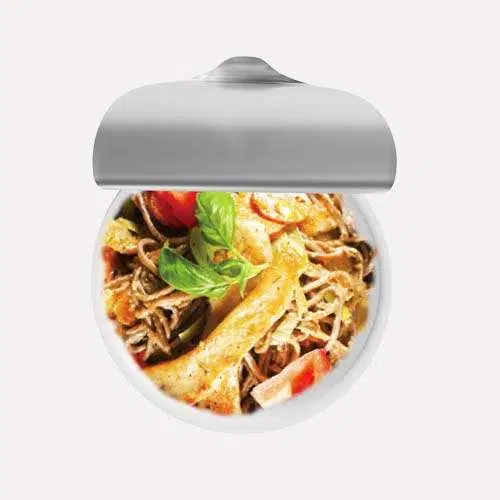Instant noodles, or cup noodles, have become a pantry staple for countless individuals who find cup noodles to be an easily accessible, quick-to-make and tastier alternative. While they are undoubtedly convenient, the question of their impact on health has sparked numerous debates. In this blog, we will explore the pros and cons of consuming the best cup noodles and offer some guidance on how to enjoy them in moderation.
Table of Contents
- What are instant noodles?
- What are the nutritional facts associated with instant noodles?
- Are cup noodles healthy?
- Should you consume noodles?
- What are the ways to make instant noodles healthier?
- Conclusion
What are instant noodles?
Instant noodles, also known as cup noodles or ramen noodles, are a type of precooked and dried noodle product that is typically packaged in a plastic or foam cup or a plastic-wrapped brick.
Cup noodles are made in such a manner that they can be quickly and easily prepared by adding hot water, which rehydrates and softens the noodles, allowing them to be ready to eat in just a few minutes.
Each packet of cup instant noodle contains a block of dried noodles, a seasoning packet, and a ready-to-eat advantage by adding hot water along with flavoring.
Typical ingredients that cup noodles contain are flour, salt, and palm oil. It comes with flavouring packets that contain salt, seasoning, and monosodium glutamate (MSG).
What are the nutritional facts associated with instant noodles?
Though the nutritional value of cup noodles differs from brand to brand and flavour, most types of noodles are typically low in fat, carbs, sodium, and select micronutrients. However, not all cup noodles are low in essential nutrients. There are vegetables on the market that are considered healthier alternatives to high-calorie, low-nutrition cup noodles.
Cup noodles contain:
- Calories: Instant noodles usually contain around 280–400 calories per serving, depending on the flavour and brand.
- Fat: A serving of instant noodles typically contains 10–20 grammes of fat, with a portion of that being saturated fat.
- Sodium (salt): Instant noodles are known for their high sodium content. A serving can contain anywhere from 800 milligrammes to over 2,000 milligrammes of sodium, which is a significant portion of the recommended daily intake.
- Carbohydrates: Instant noodles are carbohydrate-rich and provide around 40–60 grammes per serving. This includes starch from the noodles themselves.
- Fibre: Instant noodles are generally low in fibre, with only about 1-3 grammes of dietary fibre per serving.
Are cup noodles healthy?
Let’s evaluate each point one by one to reach a conclusion.
Pros of noodles
- Low in calories
Noodles are typically low in calories compared to other types of pasta. For instance, a serving of pre-packed lasagna contains 377 calories, while a serving of canned spaghetti and meatballs contains 257 calories. With low calories comes the benefit of weight loss. Hence, eating cup noodles can help shed those extra kilos.
On the other hand, the downside is that people who are eating whole noodle packs in one sitting are actually taking two servings at a time, which means they are taking double the amount of calories, resulting in weight gain instead of loss.
- Can provide micronutrients
Surprisingly, instant noodles can provide micronutrients such as fibre, protein, iron, manganese, folate, and B vitamins. Some instant noodles, which are healthier, contain several other additional nutrients. The nutritional value depends a lot on the region in which the noodles are sold and marketed.
For instance, Indonesia eats instant noodles that are fortified with vitamins and minerals and are rich in iron, which decreases the risk of anemia.
Additionally, some instant noodles are made with fortified wheat flour, which results in a potential increase in micronutrient intake without changing the delectable taste or rich texture of the noodles.
While also on the positive side, studies also claim that people who consume noodles have a 31% greater intake of thiamine and a 16% higher intake of riboflavin compared to those who do not consume noodles.
Downsides of cup noodles
- Loaded with sodium
Sodium is responsible for conducting nerve impulses, contracting and relaxing muscles, and maintaining the proper balance of water and minerals in the body. We need about 500 mg of sodium daily to carry out these functions. However, on the negative side, too much sodium intake means paving the way for high blood pressure, heart disease, and stroke.
Unfortunately, processed foods like instant noodles are loaded with too much sodium, as one packet of instant noodles has 1,760 mg of sodium, or 88% of the actual 2 gm recommendation as suggested by the WHO. Consuming one packet of ramen noodles means you’re taking a lot more sodium than you’re recommended to consume.
- Contains MSG and TBHQ
Processed foods contain many ingredients that are harmful to your health. For instance, cup noodles have tertiary butylhydroquinone, more commonly known as TBHQ, the most commonly found ingredient in instant ramen noodles. TBHQ is used to preserve processed foods. While in very small amounts, TBHQ is beneficial; however, the amount in which it is used in instant noodles has always been a controversial subject.
Regular intake of TBHQ can result in several health issues, such as adverse developmental, immune, neurological, and reproductive effects.
Another harmful ingredient found in instant cup noodles is monosodium glutamate (MSG). The most common food additive in instant noodles is used to enhance the flavour of noodles or other packed items. While the co-option of MSG has always been a subject of controversy,
- Low in fibre and protein
Though cup noodles are low in calories, they are also low in fibre and protein, which might not make them an ideal choice for weight loss.
Should you consume noodles?
Eating noodles in moderation has no harmful impact on your health, while going overboard because they are tasty and quick to make can lead to a degraded overall diet quality and adverse side effects.
But due to potential side effects, you no longer have to keep this favourite snack away, and thus JOJOSE FOODS is elaborating on a few ways to make noodles a healthier option.
What are the ways to make instant noodles healthier?
For those who love this food, it is no longer advised to shun it away, and here are several ways to make it a convenient and healthier option.
- Add vegetables: Adding fresh vegetables is always a good idea considering the freshness, unique taste, and health benefits it offers. Consider adding fresh vegetables like carrots, broccoli, onions, or mushrooms that can add a spark to your noodles.
- Topping it with protein: Since instant noodles are typically low in protein, topping it with high-protein options like eggs, chicken, fish, or tofu will provide your instant noodle bag with high protein and keep you fuller for a long time.
- Choose healthy noodles: The market is filled with a variety of noodles, and it’s you who have to make a conscious choice without compromising the taste of the noodles.
- Ditch the seasoning packet: One of the health-conscious choices you can make is ditching the seasoning packet that usually contains food additives such as MSG. It’s best to create your own broth that matches the taste of the noodles while providing you with a low-sodium, MSG, and TBHQ-free option.
Conclusion
In conclusion, cup instant noodles, while undeniably convenient and delicious, should be enjoyed in moderation due to their potential health drawbacks. While they offer some nutritional benefits, such as providing micronutrients, they are also loaded with sodium, MSG, and TBHQ, which can have adverse effects when consumed excessively. To make them a healthier choice, consider adding fresh vegetables and protein sources and opting for lower-sodium options while enjoying them sparingly as part of a balanced diet.




